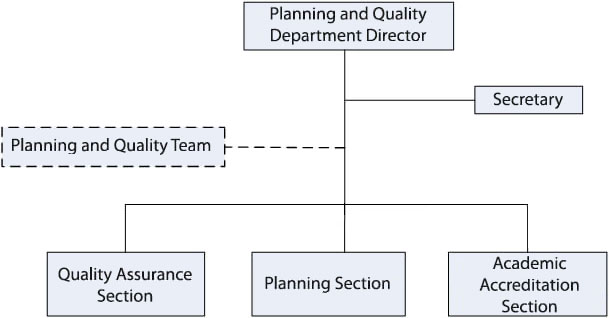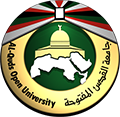The Department is administratively attached to the office of the President of the University and consists of three main sections as in the following:

First: Quality Council:
Quality Council is the decision maker and the higher commission that undertakes setting up Quality policy at QOU.
Tasks of the Council:
- Set up, review and endorse general policies for the Quality on the University level.
- Set up, review and endorse executive regulations for the Quality on the University level.
- Approve and supervise Quality projects that are listed in the University strategic plan ; among them:
- Institutional and program Self-evaluation, academic accreditation and performance indicators.
- Develop and document academic and administrative work procedures in coordination with the internal and external related parties.
- Internal and external awareness programs in Quality Assurance field.
- Promote studies and procedural researches that deal with the reality of Quality at the University and ensure implementing their recommendations.
- Approve the annual report of the Council work before submitting it to the University Council.
Second: Strategic Planning Council:
The council of Strategic Planning is a high supervisory body which is responsible for the strategic planning process at the University. The council is chaired by President of the University and other qualified members from various Departments. The council implements the following tasks:
- Direct administration and supervision on the strategic planning process
- Discussing the strategic approaches identified by the board of trustees and the University Presidency, accrediting the work plan and a timeframe for preparing the strategic plan
- Forming the technical committees to conduct studies and analysis and draft suggestions for the strategic plan, and coordinate all activities included in the planning process
- Discussing the framework of the strategic plan that includes the vision, mission and strategic objectives and ratifying them
- Forming minor working committees that include specialized working groups related to the specific fields based on the strategic objectives in the aim of developing more detailed plans based on the field
- Discussing the first draft of the strategic plan based on the results of the minor committees work, ratifying it and submitting it to the board of trustees to be discussed and accredited
- Discussing and accrediting the annual reports of the strategic plan, suggesting modifications and the relevant updates on the strategic plan.
Third: Planning And Quality Teams:
Planning and quality teams were formed to implement the projects of the department out of the belief that “planning and quality is a collective responsibility”. The teams include qualified technicians in branches and administrative units to participate in building the standards and work procedures and setting the strategic plan.
Forth: Sections Of The Department
-
Quality Assurance Section:
This section undertakes the tasks of Quality Assurance of academic, administrative, computerized systems, and programs through following-up with Quality Teams to document and develop the work, set standards, work procedures and instructions and ensure their compliance. Furthermore, the continuous development and improvement in line with the University's vision and mission.
Mission:
Quality assurance in implementing the different activities of the University in academic, administrative and computerized systems fields.
Tasks:
- Contribute to the development of the operational plan of the Department.
- Follow up with Quality Teams and the Administrative Units to set standards, work procedures and instructions according to the requirements of the Quality Management System.
- Measure the level of compliance with the adopted work procedures through internal audit and conduct the corrective and preventive actions.
- The ongoing amendment and development of standards and work procedures.
- Examine the computerized systems and check their inputs, processes and outputs.
-
Academic Accreditation Section:
This section undertakes the tasks of following-up the institutional accreditation of academic programs and the external and self-evaluation processes. It is also responsible for final approval of the documents and products issued by the University.
Mission:
Managing the institutional accreditation, the accreditation of academic programs and self-evaluation process based on the best national and international Quality standards.
Tasks:- Contribute to the development of an operational plan for the department.
- Manage self-evaluation process at institutional and academic programs levels.
- Develop self-evaluation reports and submit them to the competent authorities.
- Facilitate the field work of external evaluators during their field visits.
- Follow-up implementing the recommendations based on the results of both self and external evaluation.
- Follow-up the files of the University at the Accreditation and Quality Assurance Commission of Higher Education.
- The accreditation of documents and products issued by the University.
-
Planning section
This section coordinates the planning efforts at the University, enhances integrity, coordination and cooperation principles between the administrative and academic units in the planning field, and sets policies, programs and projects. It also enhances itself as an assistant and a real supporter of the continuous comprehensive development process based on the planning to face challenges and to be ready for reality and future needs.
Tasks:
- Setting the planning techniques for all university’s units
- Coordinating between the various departments to implement and follow up the strategic plan and its executive plans
- Coordinating between all units to enhance planning as a permanent and continuous process to guarantee the development of the university’s administrative and academic performance
- Building a comprehensive planning database about all the university’s activities
- Preparing the plans, studies and technical suggestions for policies and development projects in accordance with the university’s high administration


